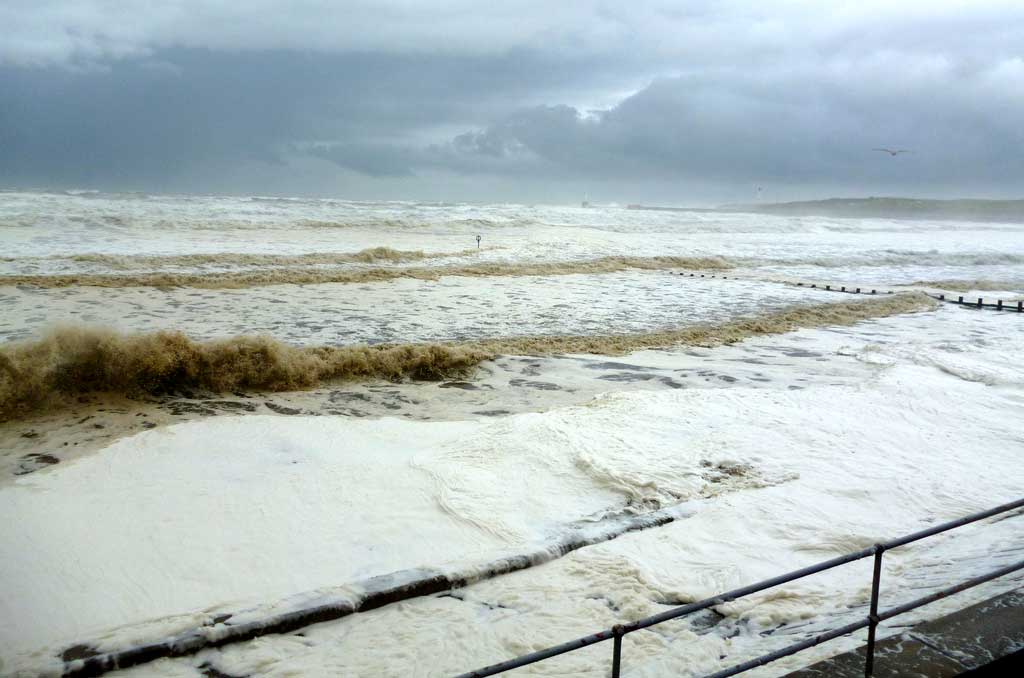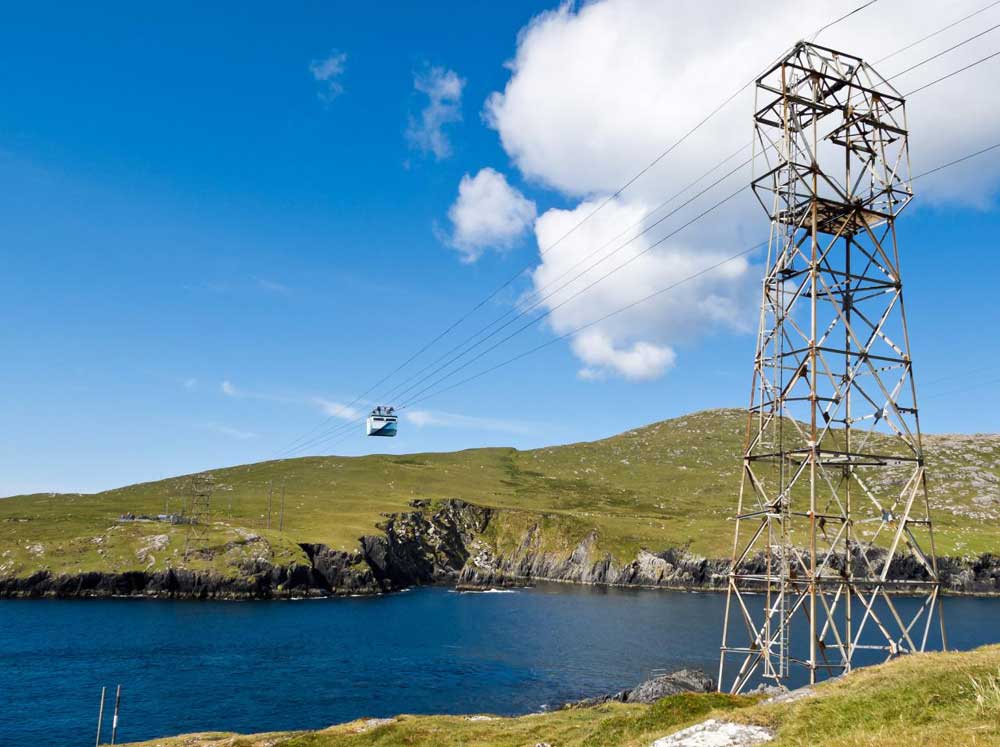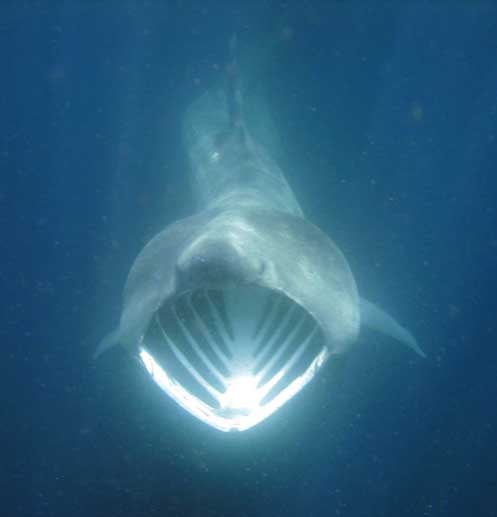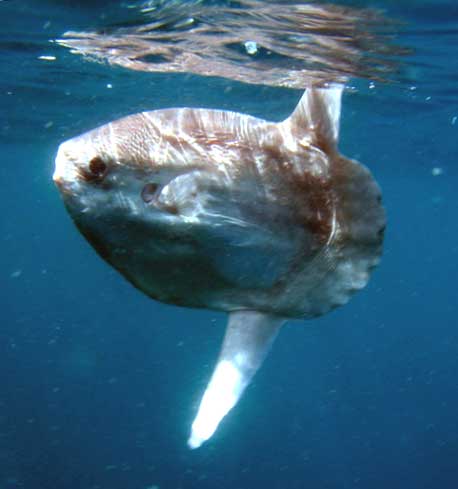-
|
| MARINE
LIFE NEWS
Reports
of marine wildlife from all around the British Isles, with pollution incidents
and conservation initiatives as they affect the flora and fauna of the
NE Atlantic Ocean
23
- 25 September 2012

Aberdeen Beach
Photograph
by Angela
Storms,
gales and torrential rain occurred over most of the British Isles.
In this study Aberdeen
beach, north-east Scotland, was covered by so much foam churned up
by the sea that it looked like snow.
14
September 2012

Stranded Sei
Whale
Photograph
by Toxic Web
Another
baleen
whale was washed up dead on a beach on the east coast of Scotland.
This time it was a large 13 metre long Sei
Whale, Balaenoptera
borealis, discovered on the sandy
beach at Elliot,
Arbroath,
around 8.30 am.
7
September 2012
Portuguese
Man-o'-War,
Physalia physalis,
were being washed onto beaches and shallow waters on the Cornish coasts
and a few bathers experienced stings from
the venomous tentacles.
6
September 2012
As
the sun rose above the ocean on the edge of the continental
shelf off south-west Ireland (on the Porcupine
Bight, west of Dursey
Island
in County Cork),
the team on the Irish
Whale and Dolphin Group's new marine research
vessel Celtic Mist
were greeted by several Fin Whales,
Balaenoptera
physalus, and
shortly afterwards had the amazing opportunity to witness two Blue
Whales, Balaenoptera
musculus, surface within 500 metres
of the boat. This is only the third discovery of Blue
Whales off Ireland on a week long trip in
which eleven cetacean species were recorded.
BMLSS
Cetaceans
Bathymetry
(British Isles)
2 September
2012
An
extremely unusual of an angling capture of a Long-billed (Atlantic) Spearfish,
Tetrapturus
pfleuger, off a beach known as the Knap,
Barry
Island, south Wales, was the first known
record of this tropical pelagic fish in British seas.

"This
fish was caught around 1 hour 45 minutes after high water, The fish was
very clean an lively an even had a sticky fish stuck to it. It was then
put back alive but wasn't very strong so I got in the sea to help it out.
It the swam off alive, minus the sucker fish which I lost."
Image
Link
Sea
View Lads Angling Club
2
September 2012
Pilot Whale Stranding
Photographs
by Jacqui Hetherington
A
mass stranding of 26 Long-finned Pilot
Whales, Globicephala melas, was
discovered at the foot of the steep cliffs at Pittenweem
(near Anstruther),
Fife,
east Scotland, at
7.10 am
in the morning. Thirteen of the Pilot Whales
which were already dead and probably only nine of the remaining animals
were likely to survive. The survivors were being attended to by the medics
and volunteers of British
Divers Marine Life Rescue. At mid
morning, reports came in of another 24 Pilot
Whales in the shallows three miles along the
coast at Cellardyke
on the north coast of the outer Firth
of Forth. By the late afternoon
three of the surviving whales
perished, but ten of them swam off strongly into open water on the high
tide,
two of them with help from the human volunteers to join the pod as they
had stranded again.
One
of the surviving Pilot Whales
subsequently died but the other survivors joined the rest of the pod and
were seen further up the Firth of Forth possibly feeding on shoals of squid
reported in the area.
On
9
September 2012 a Pilot
Whale calf was washed up dead. This calf may
have been dependent on its mother who became beached and died.
Pilot
Whale Stranding & Rescue in 2011
BMLSS
Cetaceans
24
August 2012
An
exceptionally large 7 kg (15 lb 4 oz) European
Lobster, Homarus
gammarus, was found by divers, Mark
Corp and Mark Reed, and donated to the Blue
Reef Aquarium at Portsmouth.
It appears to be the largest and heaviest Lobster
caught off the British coast since 1931.
BMLSS
Lobsters
7 August
2012
A
most extraordinary encounter occurred between a 10 metre long juvenile Humpback
Whale, Megaptera novaengliae, and
a fishing vessel of a similar length out of Whitby,
Yorkshire.
"The
whale suddenly appeared and started rubbing against the boat, swimming
under and around us and then rubbing its belly on the boat. It stayed for
about 20 minutes, and when we had to move on it went over to the Mistress
which was fishing about half a mile away. They radioed to say it was doing
exactly the same to their boat,” said
Sea Otter 2 skipper
Paul Kilpatrick.
"It
sounds as though it was trying to bond. Rubbing its belly on the boat mimics
suckling behaviour of a calf towards its mother,” said Robin
Petch of the Sea
Watch Foundation. “I have grave
worries for this youngster. My hope is that it has been reunited with its
mother, but if it has become lost, or the mother has perished, it would
be very unlikely to survive for very long.”
The
knobby head and long pale flippers identified this cetacean as the Humpback
Whale rather than the Minke
Whale, Balaenoptera acutorostrata,
of which the fishermen were familiar with in the North Sea.
Sea
Watch Foundation Sightings Page
BMLSS
Cetacea
FORUM
NEWS
Marine Wildlife
of the North-east Atlantic Ocean Mailing Groups
Marine
Wildlife of the North-east Atlantic Ocean
Yahoo
Group
New
Group: http://uk.groups.yahoo.com/group/Glaucus
 British
Marine Life Study Society British
Marine Life Study Society
facebook
Page:
https://www.facebook.com/groups/glaucus/
This
Wall is now working properly and members can now post on it. This is designed
for quick less important chatty news items. Photographs can be uploaded
quickly which is only possible on the Yahoo Group by going to the web page.
Images can be
uploaded to flickr.
http://www.flickr.com/groups/glaucus/
Wet
Thumb (Marine Aquariology) Forum Link

|
Lots
of marine wildlife reports from Shetland on facebook
Photographs
include undersea, sea mammals and birds.
Click
on the image to connect |

All
reports by Andy Horton unless the credits are given
to
other observers or reporters.
Cornish
Marine Wildlife (Ray Dennis Records) 2009
|
|
PICTURE
GALLERY
Each
month, at least one special marine image will be published from images
sent to the BMLSS. This
can be of the seashore, undersea world or any
aspect of the marine natural world, especially the underwater life, but
not restricted to life beneath the waves. Topical inclusions may be included
instead of the most meritorious, and images will be limited to the NE Atlantic
Ocean and adjoining seas, marine and seashore species and land and seascapes.

Ocean
Sunfish,
Mola mola
This
unusual portrait of the large and unusual Sunfish
was taken by diver David
Riordan snorkelling in the seas off Belmullet,
County
Mayo. This fish is usually seen on the surface of the sea often lying
at an oblique angle and underwater images
are uncommon.
More
reports of Sunfish can be found on the
BMLSS
Sunfish page
The
Sunfish
is the heaviest known bony fish in the world. It is an oceanic pelagic
traveller that feeds on jellyfish and salps.
Most records are from off the south and west coats of Ireland and the British
Isles, but there are plenty record off Scotland and its islands and in
2012
reports of Sunfish
were received from off Sussex and
one
was even discovered in Dover
Harbour.
Ocean
Sunfish (Wikipedia)
Sunfish
(Fishbase Entry)
Click
on the images for the original photographs
flickr
BRITISH
MARINE LIFE GALLERY
Shorewatch
Biological Recording
Gallery
--------------------------------------------------------------------------------------------------------------------------------------------------------
Shore Topography
Series
The
name of the particular coast should be included and any other interesting
information including the grid reference, if known. Print photographs can
be included in Exhibitions and on the BMLSS Web
Sites and electronic publications. Electronic images in *.jpg
format can also be considered for the web site. They should not exceed
350K in size.

Dursey
Island, County
Cork
Photograph
by David Hegarty
Dursey
Island
(Dóirse Oileán) lies at the
southwestern tip of the Beara
Peninsula in the west of County
Cork in Ireland. Dursey Island is 6.5 km long and 1.5 km wide. The
island is separated from the mainland by a narrow stretch of water called
Dursey Sound which has a reef of rocks in the centre of the channel which
are submerged on the high tides. The only way across
is by cable car,
opened in 1969, and it is the only one in Ireland. The journey takes about
ten minutes crossing 200 metres of the infamous Dursey Sound where strong
tides make travelling by boat hazardous.
Google
Maps View
Trip
Advisor: Dursey Island
My
Guide Island: Dursey Island
Livestock
on Cable Car Controversy
From
the furthest tip of the island, Dursey Head, there is a magnificent view.
Off the headland, there are three little islands: The Bull, The Cow, and
The Calf. The Bull has the largest Gannet
colony in Ireland and both it and The Cow have been designated as areas
of wild-life protection.

|

|
|
Basking
Shark
|
Ocean
Sunfish
|
Photographs
by David Riordan
in
the seas off County Cork, southern Ireland
Basking
Sharks,
Cetorhinus maximus,
are seen in the seas off Cork during summer and Sunfish,
Mola
mola, are a frequent occurrence in autumn. Dolphins
can be seen from the shore and whales
further out into the Atlantic Ocean.
West
Cork Travel: Dursey Island
Click
on the images for the original photographs
flickr
British
Coastal Topography
facebook
British
Coastal Topography
----------------------------------------------------------------------------
First
enquiry by EMail
to Glaucus@hotmail.com

-----------------------------------------------------------------------
Photographers
submitting pictures should indicate if they wish them to be considered
for inclusion as confirming permission takes work and time and can delay
publication of the news bulletins.

Click
on the album for more links (On-line link)
|
|
EVENTS
& DIARY
In
chronological order, the most recent events are at the top of the page.
Events open to the public, free or for a nominal charge only are included.
Most Seminars need to be booked in advance.
 |
For
details of the Porcupine Marine Nature History Society meetings click on
the link on the left
|
|
| PUBLIC
AQUARIA NEWS |
| Public
Aquaria List |
| CETACEAN
NEWS |
|
? What
to do if you find a stranded whale or dolphin ?
|
If
you find a LIVE stranded or injured whale or dolphin on the beach you must
send for help QUICKLY. A whale or dolphin stranding is an emergency and
the speed of response by a professional rescue team is perhaps the most
crucial factor in determining whether or not an animal can be returned
to the sea alive.
|
ENGLAND
|
WALES
|
SCOTLAND
|
|
0300 1234
999
|
0300 1234
999
|
0131 339
0111
|
|
CORNWALL
|
JERSEY
|
GUERNSEY
|
|
0845 201
2626
|
01534 724331
|
00 44 1481
257261
|
Would you know what to
do if you found a whale stranded on a beach?
Each year anywhere between
five and 50 whales, dolphins and porpoises are washed up on Britain's beaches.
British
Divers Marine Life Rescue, a volunteer charity, was set up in 1998
to rescue them.
BBC
News Report
LINK
TO THE STRANDINGS PAGE
|
|
PUBLICATIONS
&
WEB PAGES
BOOKS
PUBLICATIONS
----------------------------------------------------------------------------------------------------------------------------------
NEW
RECOMMENDED GUIDE

Series:
Collins Complete Guide
Collins
Complete Guide to British Coastal Wildlife
Paul
Sterry and Andrew Cleave
384
pages, approximately 1600 colour photos
Harper
Collins
List
price is £17.99 Offers available
This
comprehensive guide contains all the information for the the beginner seashore
enthusiast and plenty for the experienced rockpooler,
snorkeller and seashore visitor to make it an essential and first or second
choice purchase.
A
full review will appear in the November issue
of Torpedo.
Popular
Guide Books (Link)
--------------------------------------------------------------------------------------------------------

This
is a book about an ocean that vanished six million years ago: the ocean
of Tethys,
named after a Greek
sea nymph. The oceans are important to climate and environment,
and therefore to life on Earth. The story of Tethys is also a story of
extinctions, and floods, and extraordinary episodes such as the virtual
drying up of the Mediterranean, before being filled again by a dramatic
cascade of water over the straits of Gibraltar.
Dorrik
Stow
300
pages, 15 b/w illustrations and maps.
Oxford
University Press
ISBN-13:
9780199214297

A Field Guide to
Marine Fishes of Wales and Adjacent Waters
by
Paul Kay & Frances Dipper
£19.95
incl. p&p
Soft
cover
With
256 pages and numerous photographs supported by drawings, this book is
the most comprehensive photographic guide to marine fish currently available
in the UK. Published for the Marine
Conservation Society with support from the Countryside Council for
Wales.
Click
on the image to order this book through the Marine
Conservation Society
RECOMMENDED
PURCHASE *****
July
2010
PS:
A second revised edition of the book has been published.
SEASHORE
SAFARIS
Publisher:
Graffeg
Publisher's
Review (click on this text)
Review
by the City and County of Swansea
This
is the book I
should have written (and I dare say a few others as well) and is a much
needed introduction to the world of the seashore and the hobby of rockpooling.
It is a photographic guide to most of the common species encountered which
is much appreciated as newcomers and even experienced rockpoolers will
try and match up what they have seen to a visual image (and photographs
work better than line drawings) and this will usually get them the correct
species, (unless there are two very alike species and then you will need
a specialist identification guide like the Collins
Guide to the Seashore).
However,
the seashore is a rich and interesting habitat with a myriad of species
and 225 pages of this large pocket guide are comprehensively covered to
suit the enthusiast.
Extract
from the foreword by Keith Hiscock:
"Being
able to names to what you see and, better still, to use your observations
to add to our knowledge about the natural world is what this book is about."
But
the book for a popular audience is more than this. It starts from the assumption
that the parents and teachers and older children are unfamiliar with the
seashore environment.
RECOMMENDED
PURCHASE *****
by
Andy
Horton (August 2010)
Oakley
Intertidal on Facebook
BMLSS
Guide Books
June
2009
The
Edible
Seashore (River Cottage Handbook No. 5)
by
John
Wright was published
Not
just a cookery book: you have to go down to the shore and catch or collect
the food yourself. The 240 page hardback book (with an index) is exceptionally
well produced in quality of the binding, paper as well as the quality of
writing, information and clear useful colour photographs. It is well organised
into nine chapters:
Conclusion:
Highly
recommended, essential purchase ***** (highest five star rating).
BMLSS
Shrimping
-------------------------------------------------------------------------------------------------------------------
Marine
Fisheries Science Yearbook 2010
Publisher:
defra
Click
on this text
 |
Sharks
in British Seas
Richard
Peirce
138
pages, colour illustrations, line drawings, colour & b/w photos.
Lots
of newspaper reports.
Publisher:
Shark Cornwall
Softcover
| 2008 | £9.99
ISBN:
978-0-955869402
|

Whales
& Dolphins
of
the European Atlantic
The
Bay of Biscay, English Channel, Celtic Sea and coastal SW Ireland
by
Dylan Walker and Graeme Cresswell
with
the illustrations by Robert Still
WILDGuides
2008
£
12.00 (includes standard UK P&P)
ISBN:
978-1-903657-31-7
This
is the second fully revised and updated edition of this comprehensive guide
to the identification of whales, dolphins and porpoises (collectively known
as cetaceans) in the European Atlantic. Until very recently, most researchers
and whale-watchers were unaware of the great variety of cetaceans that
can be seen so close to the shores of western Europe. Indeed, it is only
during the last decade, when detailed cetacean surveys have been carried
out in earnest, that we have discovered how important this area is for
cetacean biodiversity.
This
field guide describes all of the 31 species of whale, dolphin and porpoise
that have occurred in the European Atlantic.
BMLSS
Cetacean Book Reviews
 |
Seashore
(Collins
New Naturalist) (Paperback)
by
Peter Hayward
Collins
2004
ISBN:
0-00-220031-7
Amazon
Web Site |
Paperback.
Pp 288. Colour & b/w photographs, illustrations, charts, maps and bibliography.
Fine copy. "New Naturalist" Seashore is a comprehensive, authoritative
account of the natural history of the seashore.
BMLSS
General Guides
BMLSS
Advanced Guides
.
JOURNALS:
SAVE
OUR SEABIRDS NETWORK
Working
to reduce Marine Pollution and to help the birds caught in it
Quarterly
Newsletter
Registered
Charity 803473
------------------------------------------------------------------------------------------------------------------
WEB
SITES
Decision-making
in Marine Mammal
Rescue
and Rehabilitation
Eastern
English Channel Habitat Atlas for Marine Resource Management
is
available for download from
http://charm.canterbury.ac.uk/atlas/pge.htm
Encyclopaedia
of Marine Life of Britain and Ireland
http://www.habitas.org.uk/marinelife/index.html?item=about
Marine
Fauna of Norway
http://www.seawater.no/fauna/e_index.htm

WET
THUMB (Marine Aquariology)
EFORUM
PAGE
BMLSS:
Marine Life Articles in Publications (Link)
|
SOCIETY
INFORMATION
The
British Marine Life Study Society are responsible for producing the journal
GLAUCUS,
which is the first publication exploring the marine life of the seas surrounding
the British Isles available to the general public. In
future, I expect the publication to be in an electronic format.
-------------------------------------------------------------------------------------------------------------------------
EMail Address
 EMail
address for messages to the British Marine Life Study Society EMail
address for messages to the British Marine Life Study Society
----------------------------------------------------------------------------------------------
Membership 2012
Plans
have not yet been finalised for the publications and subscriptions for
year 2011. Back copies of previous issues are still available.
|
|
Bulletin
Details
For
technical reasons, TORPEDO is no longer being sent out by EMail. It is
simply easier to view the bulletins on the web pages.
Subscribe/Unsubcribe
http://groups.yahoo.com/group/BMLSS-Torpedo
To
save download times, only new images are included with each Bulletin.
The
Bulletin is designed to be viewed on Internet Explorer using medium fonts
at a resolution of 1024 x 768.
Viewing
should be possible on Mozilla and other browsers. |
|
Printing
the two column version of Torpedo (from issue 28)
These
pages are not designed for the default settings on the Page Set-ups of
your browser. I recommend viewing in Microscope Internet Explorer and altering
the right and left hand columns in the Page Set-up menu to 9 mm (from 19
mm).
The
page set-up can also be amended in other web page editors.
26 September 2012
|
Copyright
2012 © British
Marine Life Study Society
---------------------------------------------------------------------------------------------------------------------------------
Compiled
on Netscape Composer 4.6 and other programs
|

